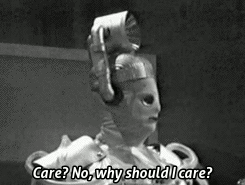Season 4, Story 2 (Overall Series Story #29) | Previous - Next | Index
Mondas, Earth's long lost twin planet, is back from a joyride around the galaxy and running on fumes. These prodigals have returned to suck to the Earth dry (the world is a vampire, indeed) and prolong their cyber-enhanced lives. Cybermen got ninety-nine problems but an emotional attachment to the old neighborhood ... or anything else for that matter ... ain't one.
 |
| Image via Nerdy Girl |
This leaves us with unfortunate amount of Ben to carry the load. Problem is, Ben and Polly are about the worst companions of the classic series, at least until Adric comes along. I want to like Ben. The idea of working class kid, Royal Navy, plucked from then-contemporary London looks great on paper. In practice, not so much. It doesn't help he's saddled with Polly. Nothing again Anneke Wills, she does about what I suppose anyone could with that character -- there's just not much there to work with.
Sandifer has a good deal to say about the Cybermen as dark mirror of humanity, but they aren't all that interesting to me as villains here. This stems, in part, from what a load of hooey Mondas is as a concept. Science, even more than usual, out the window in this one, folks.
The genuinely interesting villain here is the General in charge of the improbably located Antarctic space monitoring station. (When Four visits Antarctica in the 1970s -- we think, depending on your interpretation of when the UNIT stories are set, he's at an unrelated station and doesn't mention anything to do with Mondas coming or this story's events.) General Cutler's son is aboard a spacecraft at risk during the Cyber invasion, it seems the General is unreasonably willing to risk irradiating half of the Earth by destroying nearby Mondas with a Zee Bomb to save him. Is Cutler representative of how Britain viewed Cold War American foreign policy -- blustering, incompetent, aggressive, and rash? If so, would it be far from accurate?
(At one point, this jerk of a General remarks to the Doctor that he doesn't like his face, or his hair. All he needs to do is wait it out and it's going to change. Now that I think of it, there's a parallel here to how the real problem of Mondas is going to be solved, but basically waiting for them to suck too much energy off the Earth and overload their planet on it.)
Here's a remote base with an international staff under threat from an invading force. Hope you like this premise because it's set to become the series' modus operandi for the next few years. Right from the start we see how internationalism is going to be handled: broad stereotypes and over the top accents. Got an Italian around, he's going to be girl crazy atsa the truth, mama mia! Better is the casting of a black actor to play an astronaut. If he was a bit of a ham, he certainly wasn't alone in that regard. As much as we can credit the production team for this diversity of casting, listening to Anneke Wills discuss the shoot, we have to cringe for how much of a prick Hartnell was about working with Earl Cameron. (The DVD extras include an interview with Cameron who remarked that Hartnell's racism was "his problem, not mine.")
But that's not the note we want to go out on for Hartnell's final regular appearance as the Doctor. Despite his personal failings, he was, by all accounts, devoted to the role. He cared passionately about series and the children who looked up to him as the Doctor. He battled through failing health even after being devastated when informed he was to be replaced.
Imperious, with a twinkle in his eye. Brusque, yet playful. (Some of those so-called Billy Fluffs must have been eccentricity, surely.) Whether your first or favorite, is Four, or Ten, your Doctor is an inheritor of a mantle first worn by William Hartnell -- the Doctor.